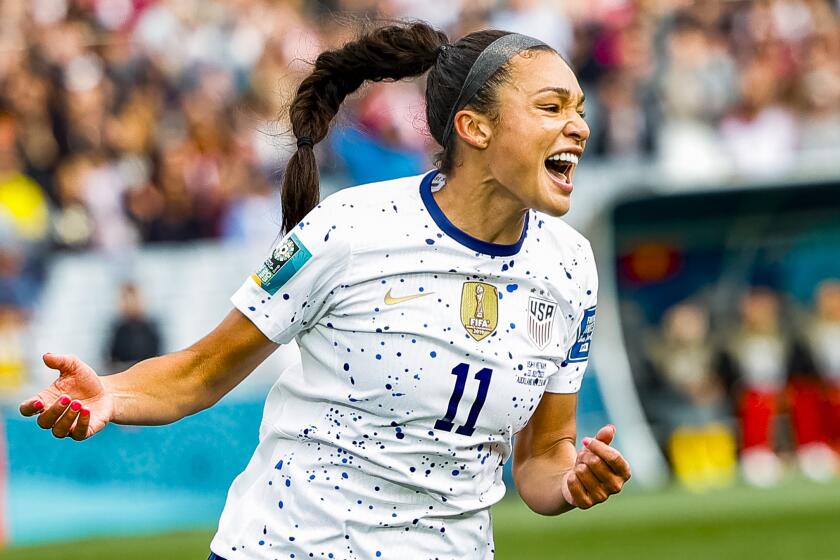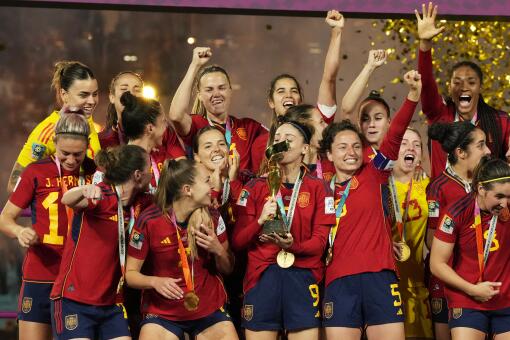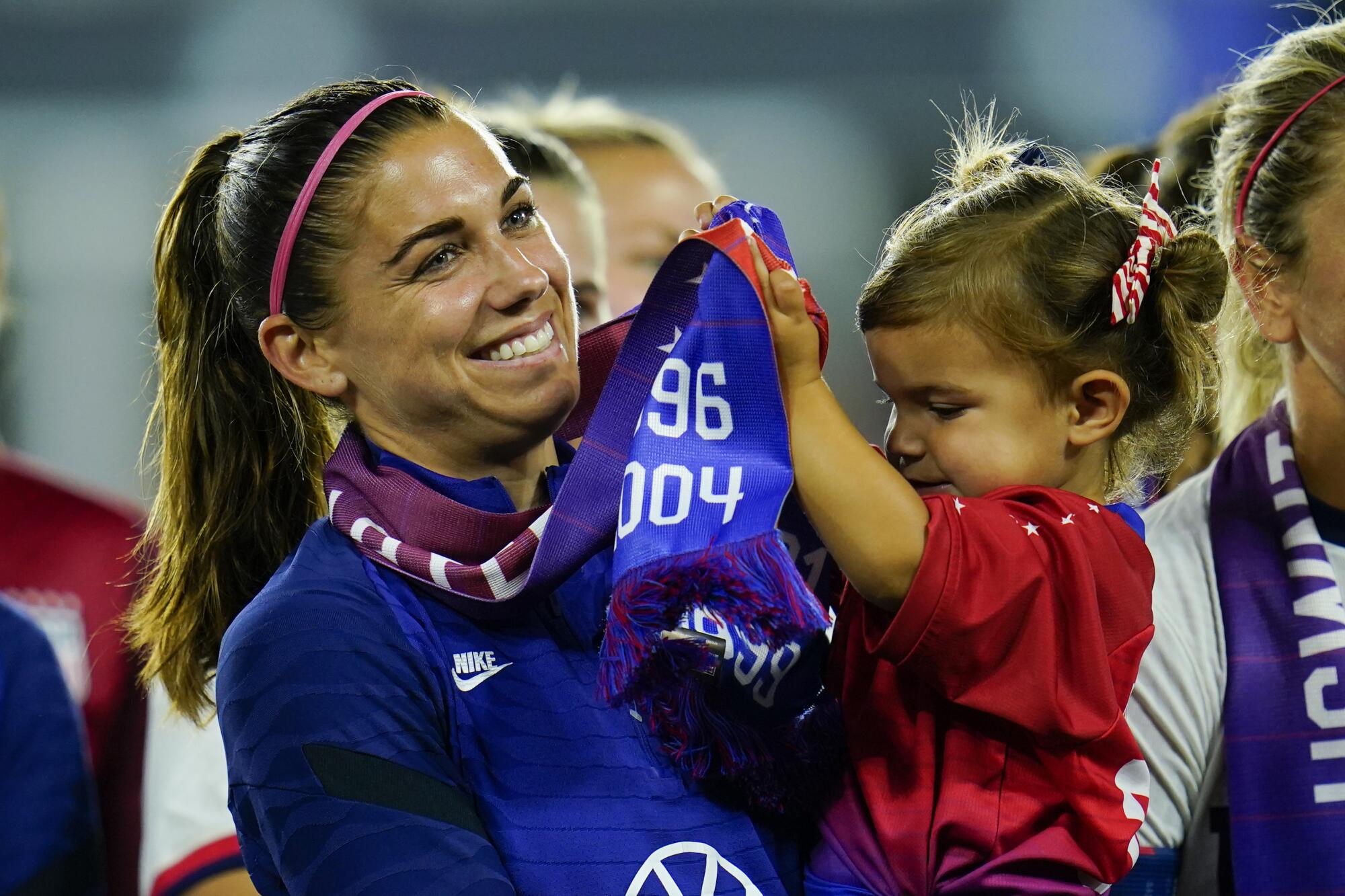
- Share via
WELLINGTON, New Zealand — The little girl didn’t care that her mother had just lost an important game.
She didn’t care about the league table, the Golden Boot race or the San Diego Wave’s long winless streak either. None of that matters when you’re 3 years old.
“She wants to kick the ball around, she wants to score a goal with mommy and wants to wave to the fans,” Alex Morgan said of her postgame routine with daughter Charlie, one that has added important perspective to an unparalleled career now in its twilight. “I have to forget about everything that’s happened and just enjoy being mom because I know that this isn’t going to last forever.”
Morgan and fellow national team starters Crystal Dunn and Julie Ertz have given birth since the U.S. won its last World Cup four years ago, giving this summer’s roster a record three soccer moms. And all three said motherhood has changed the way they view the game as they chase another title this summer in New Zealand and Australia.
“Everything you do is now seen through the eyes of your child. That’s so powerful.”
— Crystal Dunn, U.S. soccer star and mom
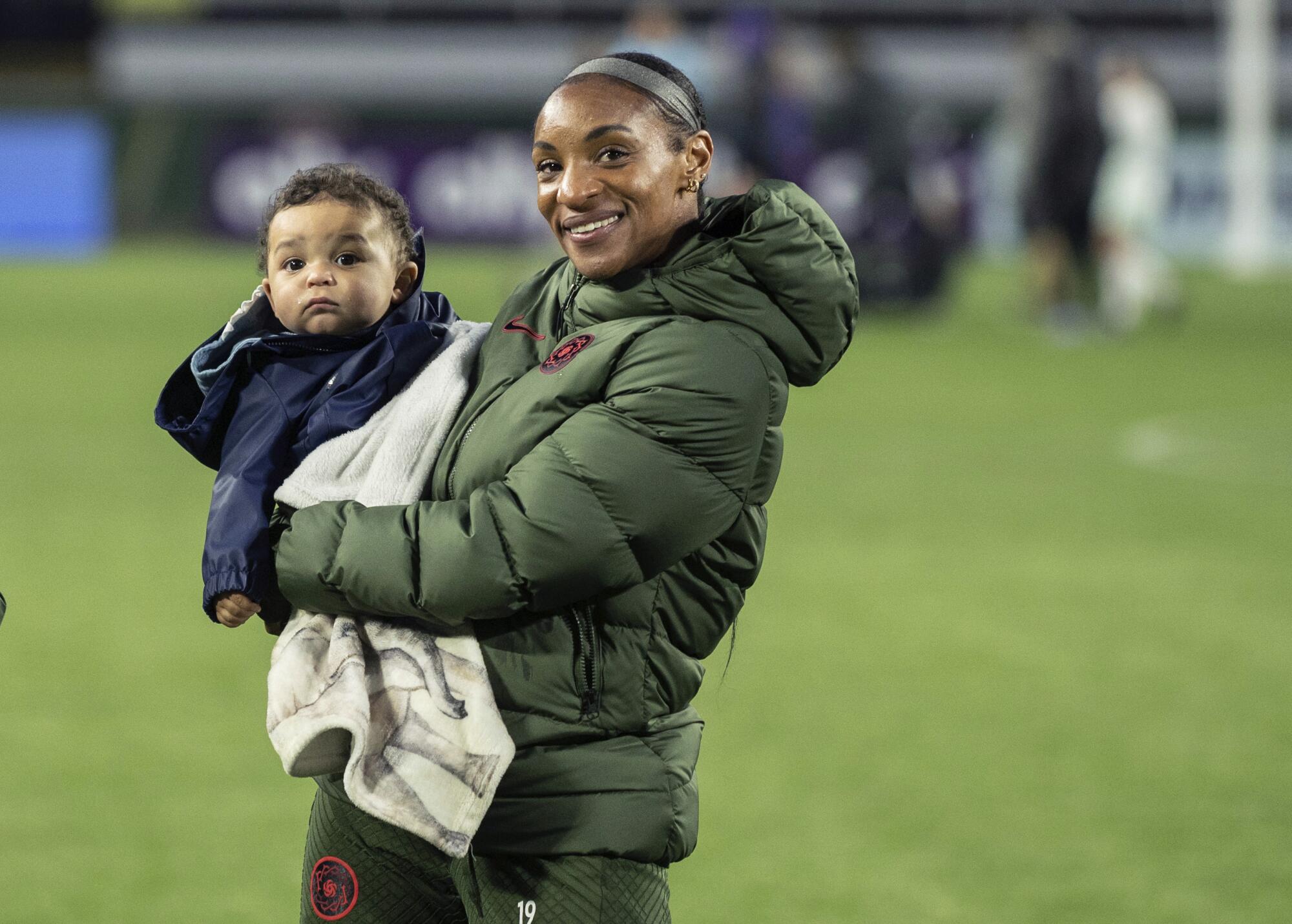
The U.S. plays Portugal on Tuesday in Auckland in a game that will determine whether the Americans will advance to the knockout rounds and what path it will take if it gets there.
“Anyone who is a parent knows that kids are life-changing,” said Dunn, 31, a defender who gave birth to a son, Marcel Jean, 14 months ago. “You have this newfound perspective. Everything you do is now seen through the eyes of your child. That’s so powerful.”
“Before I could be selfish with my career,” added Ertz, 31, whose son Madden was born last August. “Now it’s almost the opposite.”
Even Tori Penso, one of six U.S. officials working this World Cup, saw her career change after having three children, an experience that changed her outlook as well.
“Physically giving birth is quite the labor right? There’s a reason they call it labor,” said Penso, 37. “And then when you’re pregnant, it takes time away from being on the pitch. Other people will get those opportunities that you aren’t because you’re not on the pitch.
“That time away made me realize just how much I love doing this and how much I missed it. And so I came back a little hungrier and more excited to take the pitch and more grateful for the moments on the field because you never know when it could be your last. That perspective, whether that’s maturity or motherhood, has really helped me as far as the mind-set.”
Breaking down the top players, start times, schedules and scores for each of the four-team groups in the 2023 Women’s World Cup.
Many of the 32 teams that started this World Cup 2½ weeks ago have players who are mothers. Few have incorporated their children into the team like the U.S. has done.
“It’s really fun,” midfielder Savannah DeMelo said. “It’s awesome to see them being such awesome soccer players on the field, but then off the field they’re awesome moms. Having the kids there, they’re all great. They’re a lot of fun to be around.”
All three children are being looked after by family members in New Zealand, visiting with their mothers — and their mothers’ teammates — between training sessions and other team activities. However, U.S. Soccer’s collective bargaining agreement with its players provides team moms with access to maternity leave and paid nanny care — including airfare, hotel rooms, meals and a daily stipend for babysitters — at national team camps and on trips such as the World Cup.
For that they can thank Joy Fawcett, the first U.S. soccer mom, and her coach Anson Dorrance. When Fawcett, already a World Cup champion at 26, told Dorrance she wanted to have a baby, she feared he would force her to choose between soccer and her family.
“I’m going to have kids and I’m going to bring them with me. Is that OK with you?” Fawcett remembers asking the coach. “He said, ‘Yeah, that’s fine.’”
“That’s all I wanted,” said Fawcett, who would go on to have three daughters while winning another World Cup and an Olympic gold medal.
Kate Markgraf, who played in two World Cups alongside Fawcett and had three children during her playing career, got U.S. Soccer to expand its pregnancy protection and maternity leave policies after taking over as general manager of the women’s national team four years ago. Partly as a result, Dunn said she felt the federation and the team had her back from the day she found out she was pregnant.
“The support around moms is very much there,” she said. “I wouldn’t have been able to bounce back, come back and feel welcomed back if I didn’t have the resources and the support that I had.
“It was like ‘all right, what do you need? How do we support you?’”
Morgan, 34, a forward whose 14 goals since giving birth are the most by a USWNT soccer mom, said that’s just another example of how the U.S. team has pushed for things beyond pay equity for women players.
“I’m really grateful for the women before me that fought for mom athletes,” she said. “I have fought hard for female athletes to get the support and resources needed to be able to continue to stay on top of our game after having children. That’s a testament to the support that we’ve gotten from this team, the federation, from the NWSL, from our sponsors.
“It’s not the case around the world. We’re trying to make a stand and show that the support is necessary in order for us to compete at the highest level.”
For the three moms on the U.S. World Cup team, that support has not only extended their careers, it has also made them better players, which is saying something since Morgan, Ertz and Dunn were already three of the most accomplished players in the world. They have combined to play in 37 World Cup games, score 10 goals and win five championships before having kids.
“I never knew if this was going to be a possibility or how. So I’m very grateful for it.”
— Julie Ertz, U.S. soccer star on becoming a mother and playing with national team
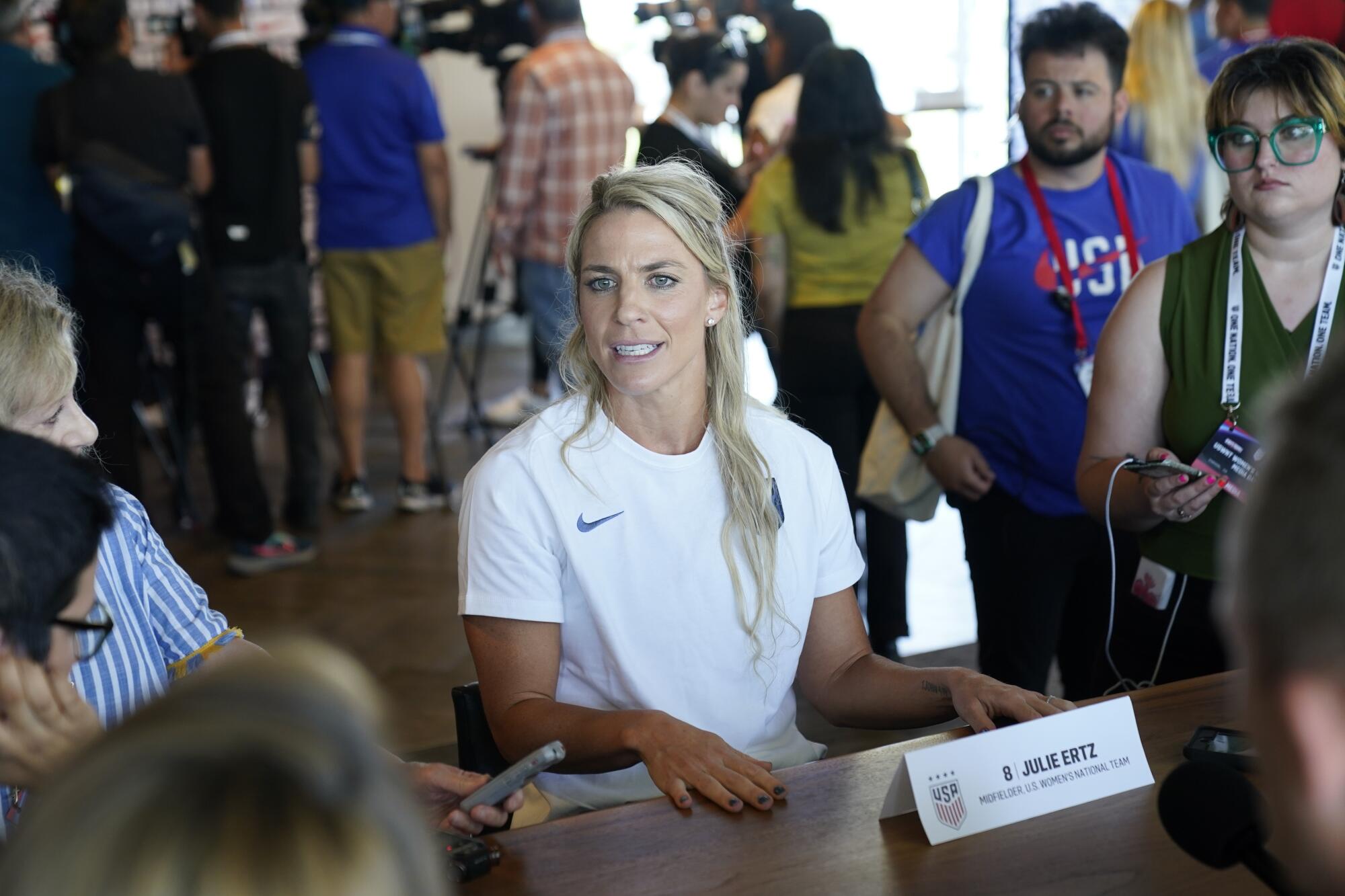
“There’s definitely joy that he’s added to my game,” Ertz said of her 11-month-old son. “It’s just such a surreal moment. I never knew if this was going to be a possibility or how. So I’m very grateful for it.”
“It’s made me a better person. It’s made me a better player,” added Dunn, who said it’s time to bury the misguided notion that being a mother and soccer player are mutually exclusive choices.
“We need to break down the stigma of women wanting to pursue motherhood while they are playing and pursuing their career,” she said. “It used to be you’re either a soccer player or you’re going to be a mom. We need to normalize that idea that should a woman want to pursue that choice, it’s not a death sentence.
“Women being pregnant, coming back, like it is possible when you put the resources behind them.”
All three women continued training until deep in their pregnancies and, with the help of supportive spouses, began working out again shortly after giving birth. That allowed them to return to the field within months.
Still, Ertz said the short break from soccer, combined with the thrill of having a baby, rekindled her love for the sport. For Morgan, her daughter has provided new meaning to the final years of her career.
“There’s no stronger motivator for her than just seeing Charlie,” said Morgan’s husband, Servando Carrasco, a former Galaxy midfielder. “That’s also why she’s kind of refueled and kind of refocused a bit.”
But it’s bigger than that. Which is why the most important part of every San Diego Wave home match happens postgame when Charlie waddles on to the field, Morgan’s No. 13 and the word “MOM” stitched in white on the back of her tiny Wave jersey.
“You know,” Carrasco continued, “having Charlie, life is much bigger than just the game, right? It’s like, you miss a PK, yes, you might lose the game. Charlie comes on the field, she couldn’t care less that happened. She comes on the field and she’s smiling at mommy and all she wants to do is kick the ball with mommy.
“Alex is still the competitor and she wants to win. But then when you see your daughter come on the field with a huge smile on her face and all she wants to do is kick a ball into the net? It kind of gets you almost back to neutral. It’s like, well, this is the most important thing in life.”
More to Read
Go beyond the scoreboard
Get the latest on L.A.'s teams in the daily Sports Report newsletter.
You may occasionally receive promotional content from the Los Angeles Times.

